Abstract
Spinach chloroplasts, isolated by techniques yielding preparations with high O2- evolving activity, showed rates of light-dependent acetate incorporation into lipids 3-4 fold higher than any previously reported. Incorporation rates as high as 500 nmol of acetate/h per mg of chlorophyll were measured in buffered sorbitol solutions containing only NaHCO3 and [1-14C]acetate, and as high as 800 nmol/h per mg of chlorophyll when 0.13 mM-Triton X-100 was also included in the reaction media. The fatty acids synthesized were predominantly oleic (70-80% of the total fatty acid radioactivity) and palmitic (20-25%) with only minor amounts (1-5%) of linoleic acid. Linolenic acid synthesis was not detected in the system in vitro. Free fatty acids accounted for 70-90% of the radioactivity incorporated and the remainder was shared fairly evenly between 1,2-diacylglycerols and polar lipids. Oleic acid constituted 80-90% of the free fatty acids synthesized, but the diacylglycerols and polar lipids contained slightly more palmitic acid than oleic acid. Triton X-100 stimulated the synthesis of diacylglycerols 3-6 fold, but stimulated free fatty acid synthesis only 1-1.5-fold. Added glycerol 1-phosphate stimulated both the synthesis of diacylglycerols and palmitic acid relative to oleic acid, but did not increase acetate incorporation into total chloroplast lipids. CoA and ATP, when added separately, stimulated acetate incorporation into chloroplast lipids to variable extents and had no effect on the types of lipid synthesized, but when added together resulted in 34% of the incorporated acetate appearing in long-chain acyl-CoA. Pyruvate was a much less effective precursor of chloroplast fatty acids than was acetate.
Full text
PDF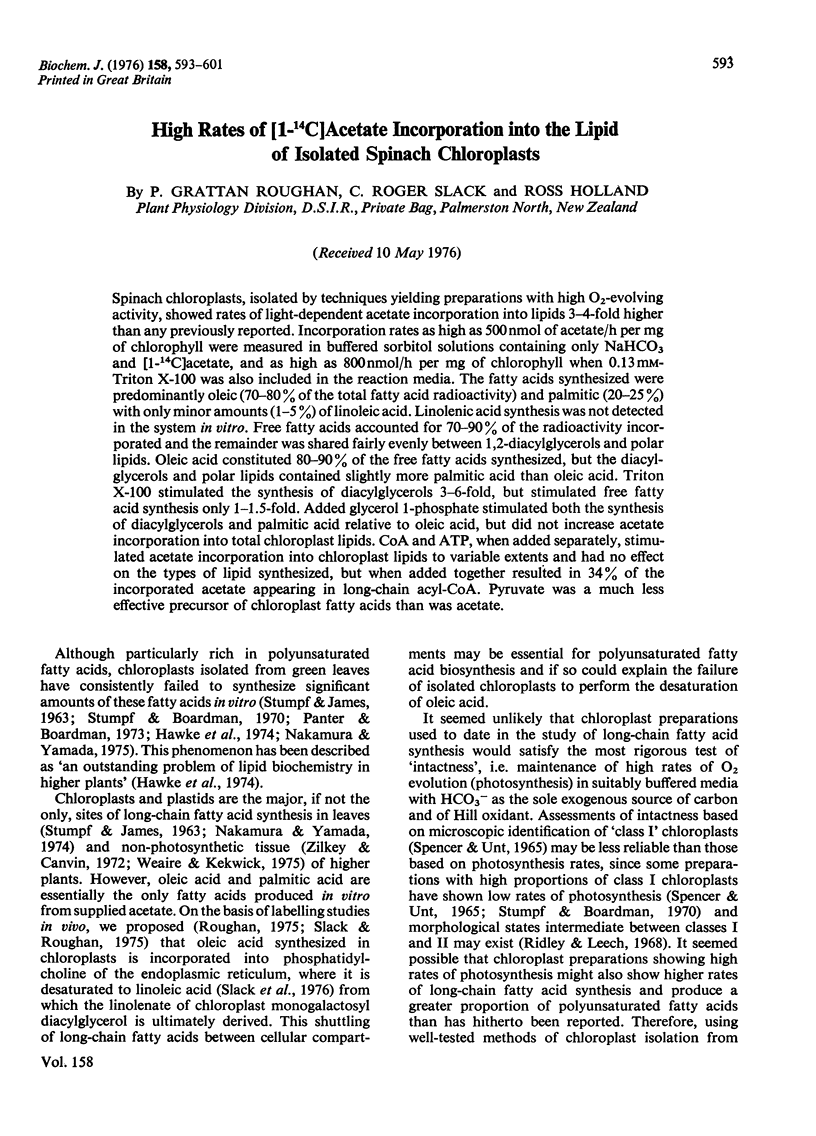
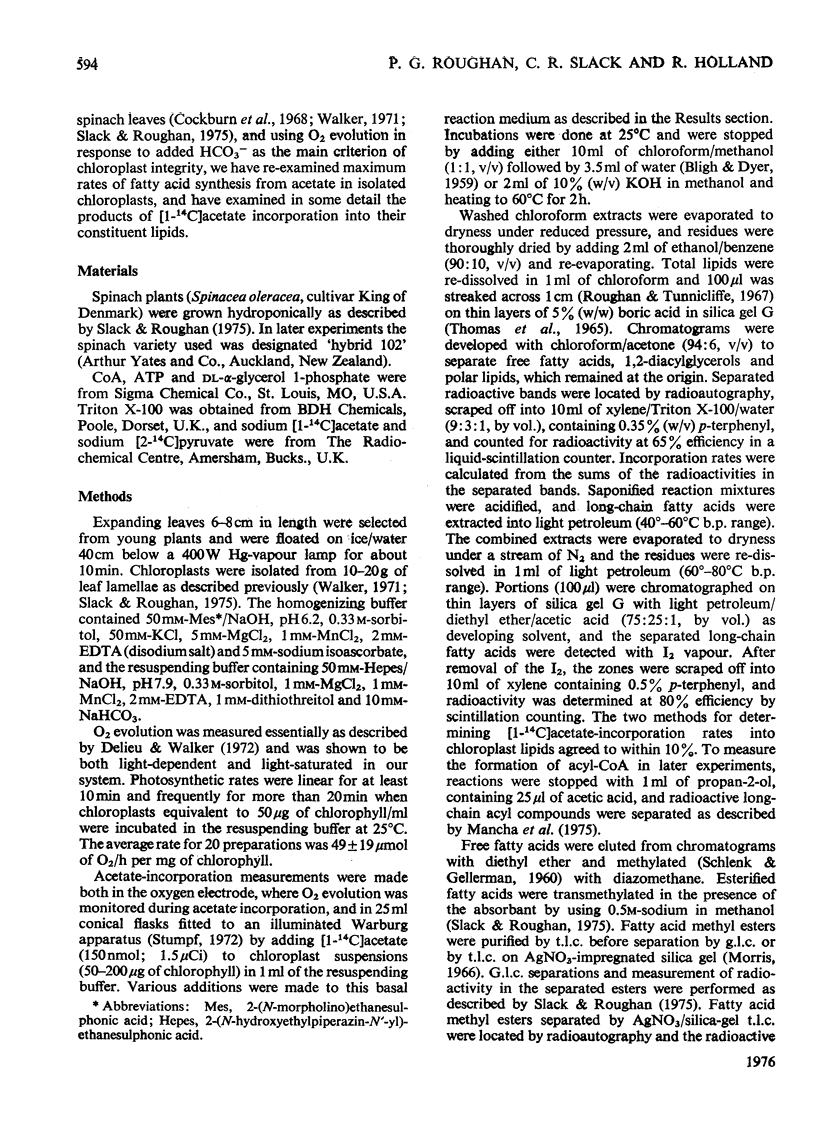
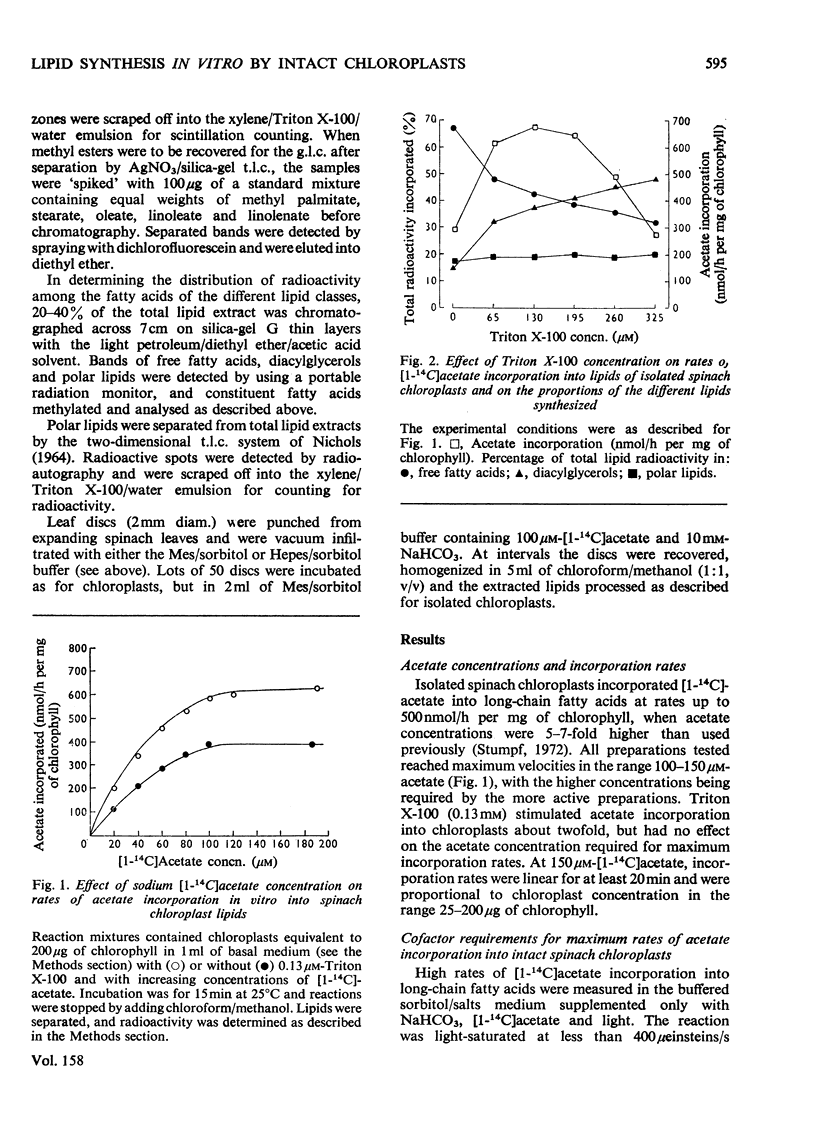
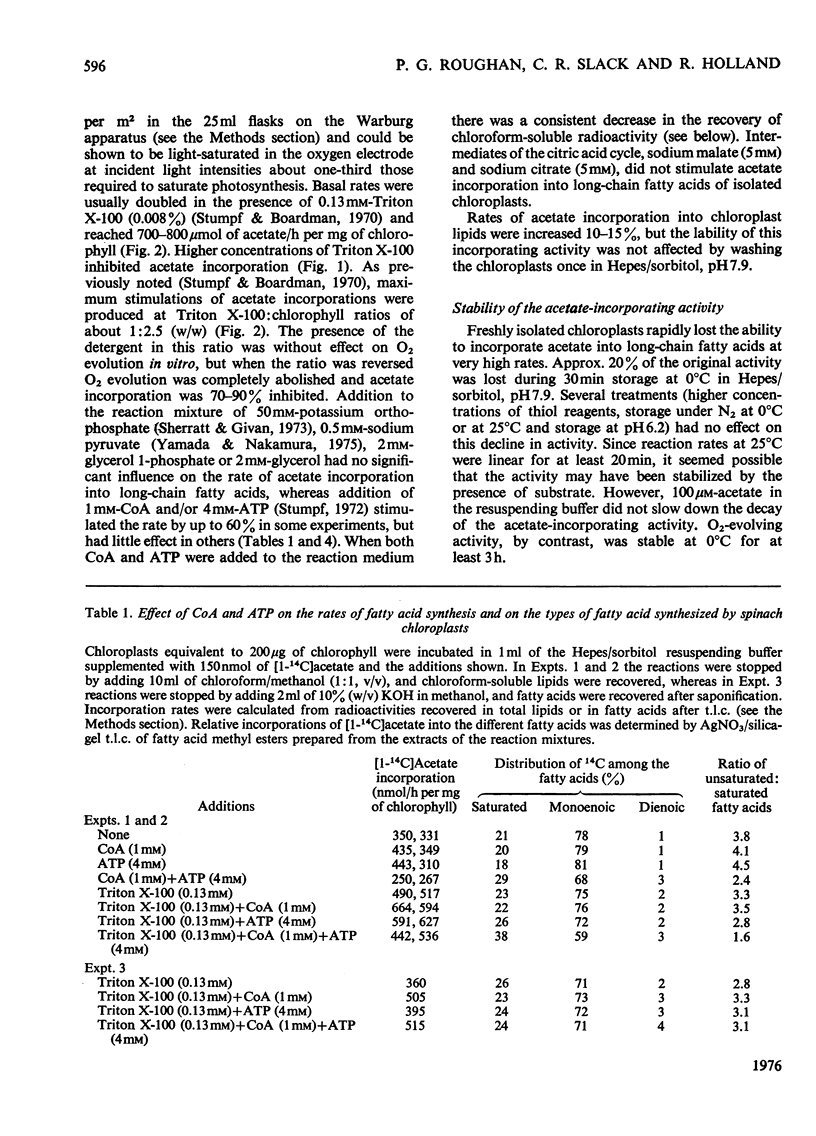
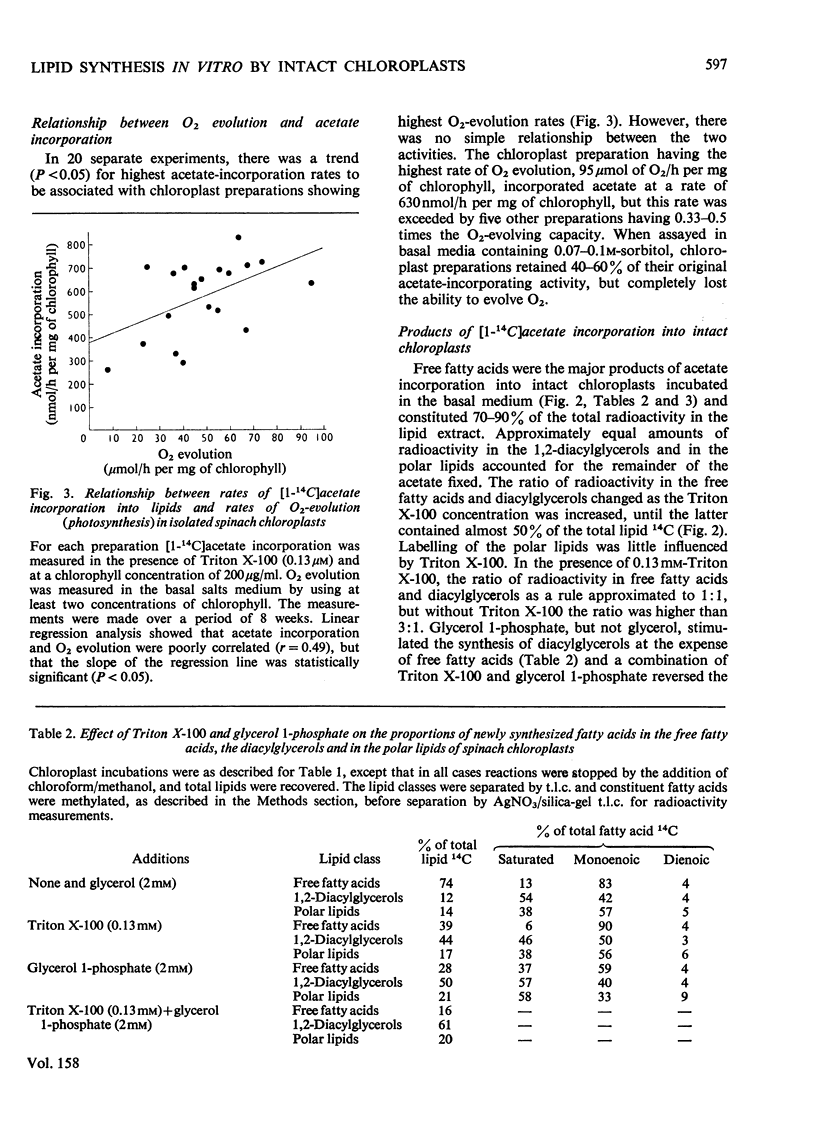
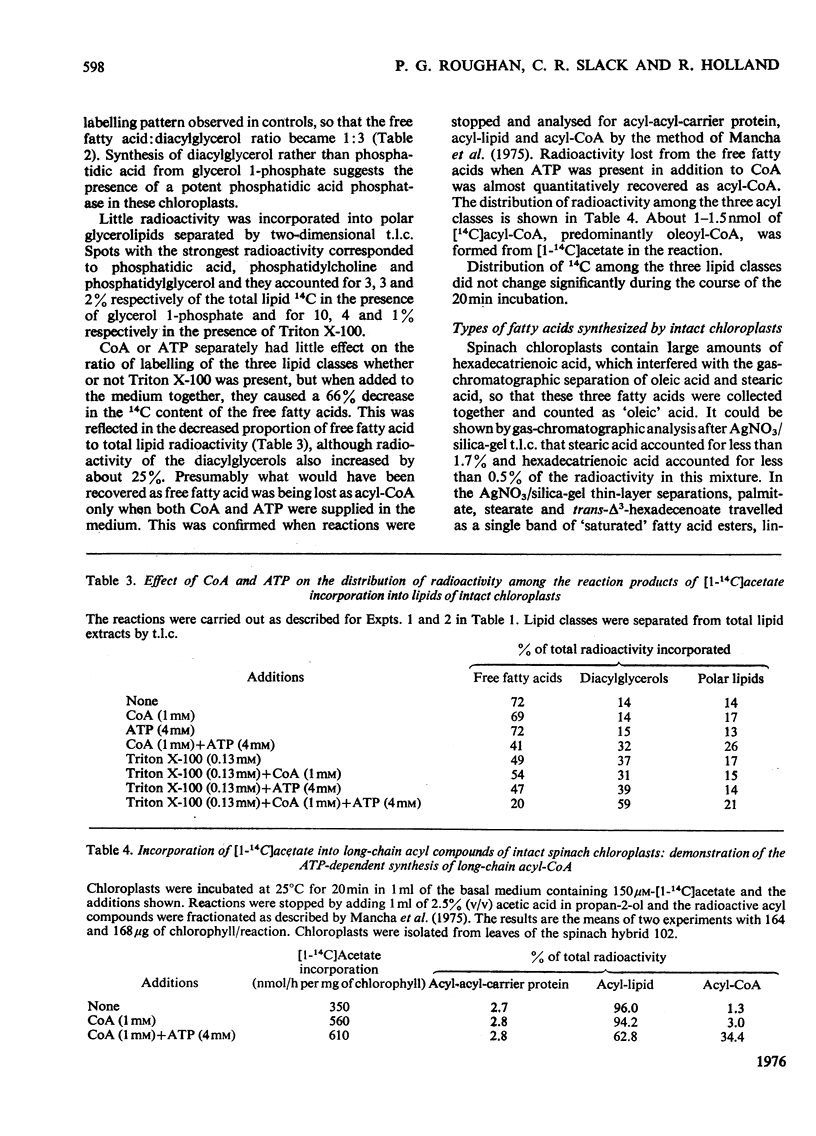
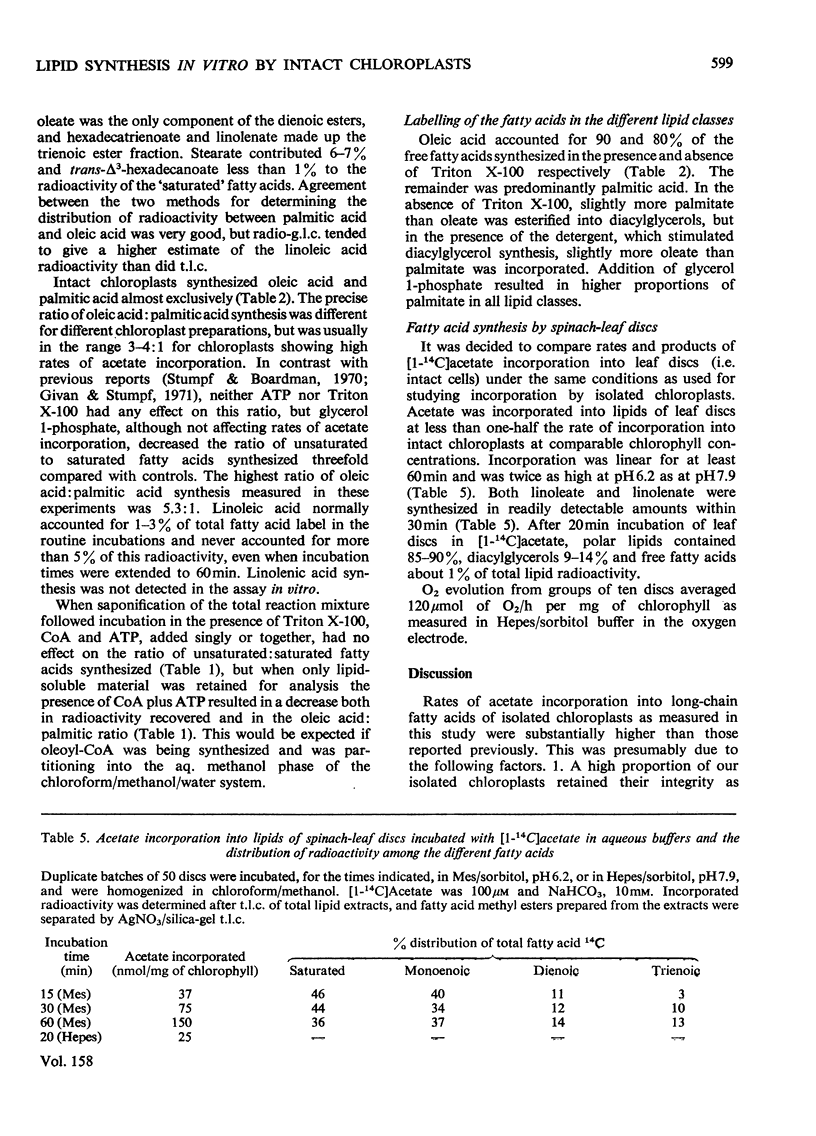
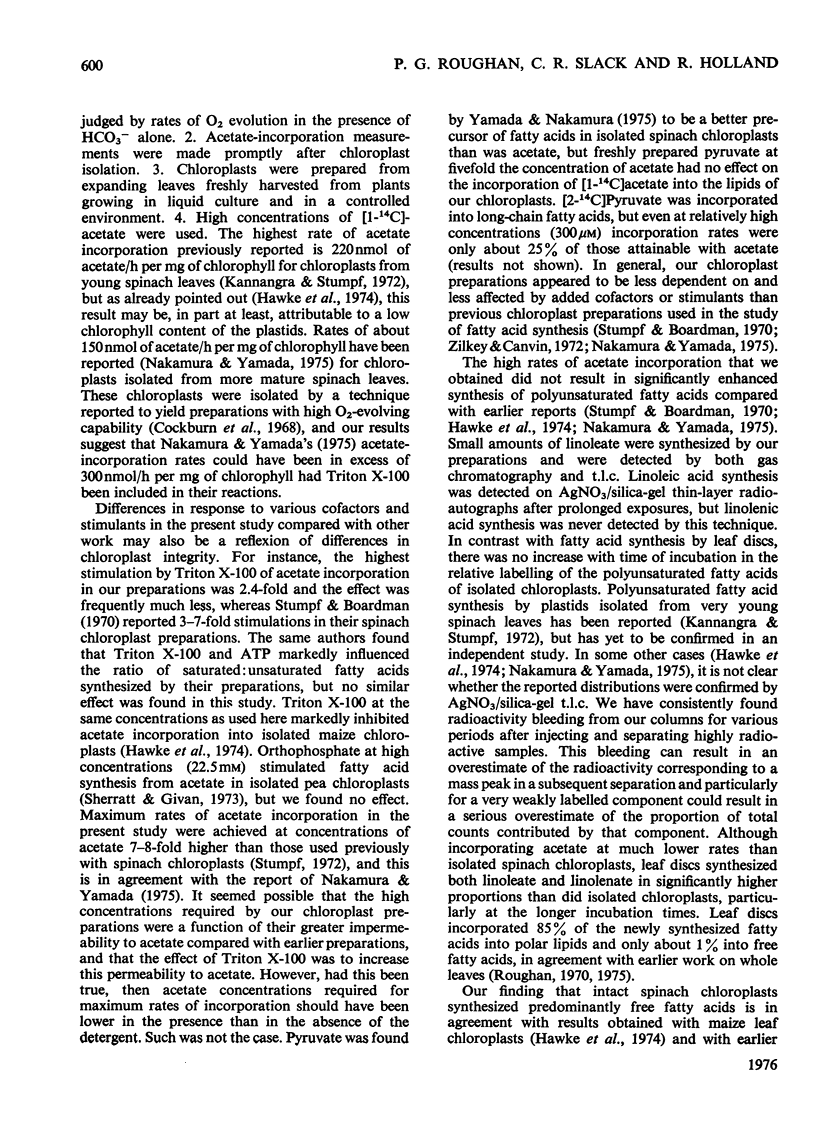
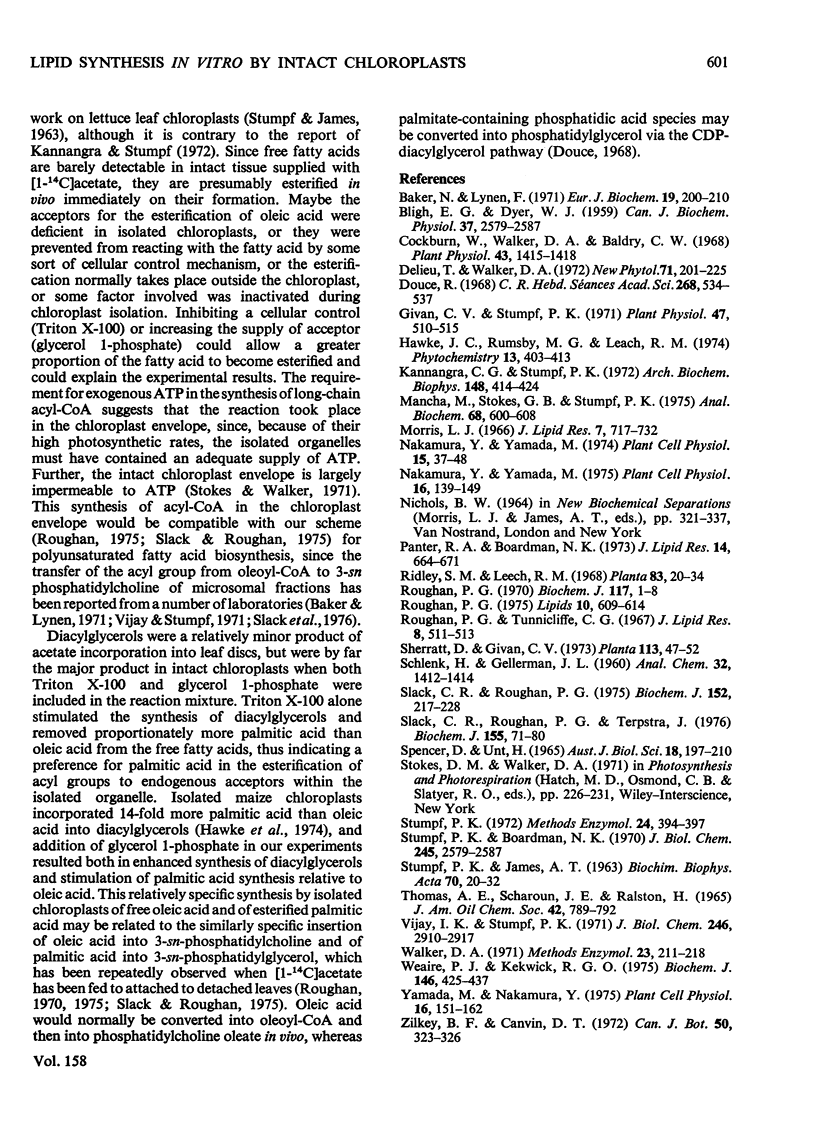
Selected References
These references are in PubMed. This may not be the complete list of references from this article.
- Baker N., Lynen F. Factors involved in fatty acyl CoA desaturation by fungal microsomes. The relative roles of acyl CoA and phospholipids as substrates. Eur J Biochem. 1971 Mar 11;19(2):200–210. doi: 10.1111/j.1432-1033.1971.tb01305.x. [DOI] [PubMed] [Google Scholar]
- Cockburn W., Walker D. A., Baldry C. W. The isolation of spinach chloroplasts in pyrophosphate media. Plant Physiol. 1968 Sep;43(9):1415–1418. doi: 10.1104/pp.43.9.1415. [DOI] [PMC free article] [PubMed] [Google Scholar]
- Givan C. V., Stumpf P. K. Fat Metabolism in Higher Plants: XLV. Some Factors Regulating Fatty Acid Synthesis by Isolated Spinach Chloroplasts. Plant Physiol. 1971 Apr;47(4):510–515. doi: 10.1104/pp.47.4.510. [DOI] [PMC free article] [PubMed] [Google Scholar]
- Kannangara C. G., Stumpf P. K. Fat metabolism in higher plants. I. The biosynthesis of polyunsaturated fatty acids by isolated spinach chloroplasts. Arch Biochem Biophys. 1972 Feb;148(2):414–424. doi: 10.1016/0003-9861(72)90159-2. [DOI] [PubMed] [Google Scholar]
- Mancha M., Stokes G. B., Stumpf P. K. Fat metabolism in higher plants. The determination of acyl-acyl carrier protein and acyl coenzyme A in a complex lipid mixture 1,2. Anal Biochem. 1975 Oct;68(2):600–608. doi: 10.1016/0003-2697(75)90655-7. [DOI] [PubMed] [Google Scholar]
- Morris L. J. Separations of lipids by silver ion chromatography. J Lipid Res. 1966 Nov;7(6):717–732. [PubMed] [Google Scholar]
- Panter R. A., Boardman N. K. Lipid biosynthesis by isolated plastids from greening pea, Pisum sativum. J Lipid Res. 1973 Nov;14(6):664–671. [PubMed] [Google Scholar]
- Roughan P. G. Phosphatidyl choline: Donor of 18-carbon unsaturated fatty acids for glycerolipid biosynthesis. Lipids. 1975 Oct;10(10):609–614. doi: 10.1007/BF02532725. [DOI] [PubMed] [Google Scholar]
- Roughan P. G., Tunnicliffe C. G. Simple devices for the application of samples as narrow streaks for thin-layer chromatography. J Lipid Res. 1967 Sep;8(5):511–513. [PubMed] [Google Scholar]
- Roughan P. G. Turnover of the glycerolipids of pumpkin leaves. The importence of phosphatidylcholine. Biochem J. 1970 Mar;117(1):1–8. doi: 10.1042/bj1170001. [DOI] [PMC free article] [PubMed] [Google Scholar]
- STUMPF P. K., JAMES A. T. The biosynthesis of long-chain fatty acids by lettuce chloroplast preparations. Biochim Biophys Acta. 1963 Feb 19;70:20–32. doi: 10.1016/0006-3002(63)90715-7. [DOI] [PubMed] [Google Scholar]
- Slack C. R., Roughan P. G., Terpstra J. Some properties of a microsomal oleate desaturase from leaves. Biochem J. 1976 Apr 1;155(1):71–80. doi: 10.1042/bj1550071. [DOI] [PMC free article] [PubMed] [Google Scholar]
- Slack C. R., Roughan P. G. The kinetics of incorporation in vivo of (14C)acetate and (14C)carbon dioxide into the fatty acids of glycerolipids in developing leaves. Biochem J. 1975 Nov;152(2):217–228. doi: 10.1042/bj1520217. [DOI] [PMC free article] [PubMed] [Google Scholar]
- Stumpf P. K., Boardman N. K. Fat metabolism in higher plants. XXXIX. Effect of adenosine triphosphate and triton X-100 on lipid synthesis by isolated spinach chloroplasts. J Biol Chem. 1970 May 25;245(10):2579–2587. [PubMed] [Google Scholar]
- Stumpf P. K. Fatty acid synthesis by spinach chloroplasts. Methods Enzymol. 1972;24:394–397. doi: 10.1016/0076-6879(72)24085-x. [DOI] [PubMed] [Google Scholar]
- Vijay I. K., Stumpf P. K. Fat metabolism in higher plants. XLVI. Nature of the substrate and the product of oleyl coenzyme A desaturase from Carthamus tinctorius. J Biol Chem. 1971 May 10;246(9):2910–2917. [PubMed] [Google Scholar]
- Weaire P. J., Kekwick R. G. The synthesis of fatty acids in avocado mesocarp and cauliflower bud tissue. Biochem J. 1975 Feb;146(2):425–437. doi: 10.1042/bj1460425. [DOI] [PMC free article] [PubMed] [Google Scholar]


